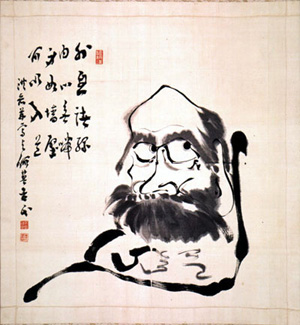Le Soi est le seigneur du soi : quel autre Seigneur pourrait-il être ? Lorsqu'un homme soumet bien son soi, il gagne une maîtrise qui est difficile à obtenir. "
-- Le Bouddha (Dhammapada, XII.4)

Ceux qui cherchent à comprendre le Chan saisissent rarement la nature de la transcendance de l'ego, transcendance qui est pourtant l'expérience propre du Chan. Cette transcendance n'est pas accessible par l'intellect, seule une pratique juste en permet
un aperçu et n'importe qui peut y arriver.
Afin de distinguer l'ego, du Soi bouddhiste (le « Vrai Soi » ou « Soi transcendantal » ou « Nature de Bouddha »), il peut être utile d'employer le substantif « moi » pour désigner l'ego et le substantif « Soi » pour désigner notre Vraie nature.
Quelle est la nature de ce « Soi » ? Dans le Chanla réponse se situe au plan spirituel, dépend de l'introspection et ne peut être clairement donnée qu'après avoir atteint un haut degré de conscience. Sur le plan séculaire, nous pouvons cerner ce que désigne le Soi par ce qu'il n'est pas : il ne s'agit pas de ce à quoi nous nous identifions. Autrement dit : le Soi n'est pas Moi, ego.
Si nous savons tous en théorie que l'arrogance, la fierté et la vanité sont caractéristiques
de l'ego, il est plus facile de le voir se manifester chez les autres, qu'en nous‐mêmes :
c'est tellement pénible à reconnaître que nous nous détournons souvent de
l'introspection pour revenir à nos habitudes. C'est comme cela que se traduit en fait
l'immense emprise que notre ego peut avoir sur nous. Et fort est le danger de se laisser
charmer, convaincre que nos opinions sont pertinentes, elles, que nos expériences ont
plus de poids et que nous savons mieux... Fort est le danger de se laisser dominer par
notre ego. Or, si nous abandonnons le travail d'autocritique, qu'est‐ce qui nous
différencie de celui ou de celle que nous conseillons ? Quand nous perdons le courage de
l'introspection, notre ego prend les rênes ; plus complaisamment nous le laissons
intervenir, plus il devient fort et plus nous nous éloignons de nous‐mêmes, de notre « Soi véritable », avec comme résultat tous les comportements égotistes que nous connaissons, mais aussi, et c'est bien plus grave, l'altération de nos capacités à connaître qui nous sommes en tant qu'êtres humains. C'est là que réside la source des souffrances éprouvées à négliger sa vie spirituelle. Il n'y a qu'en reconnaissant nos ego pour ce qu'ils sont, que nous pouvons commencer à les maîtriser.
L'ego est d'abord et avant tout préoccupé de lui‐même - de sa force, de sa domination -
et fera en sorte que, nous engageant sur un chemin de déceptions, nous le prenions pour
notre volonté. En nous nous identifions à nos pensées, nos actes et nos croyances
(autant de rouages de ce que nous appelons notre Moi), nous devenons notre Ego. Nous
sommes « de droite » ou « de gauche », pieux, végétariens ou gentils ou victimes ou
encore forts, spirituels, intelligents, sensibles... Ce faisant, nous devenons le centre de
notre univers. Un tout petit univers, même si nous nous aveuglons sur ses limites,
combien étroites !
L'ego, notre Moi, est un véritable obstacle de notre périple spirituel. Le Bouddha
Sâkyamuni en sonnait l'alerte dans beaucoup de petites histoires (Les contes des Jātakās
qui lui sont attribués, peuvent avoir des origines beaucoup plus anciennes) aussi bien
que dans les versets du Dhammapada.
Le défi du pèlerin spirituel consiste à desadhérer de ce qu'il croit être. En réalité, nous
sommes tout excepté ce que nous pensons être et en s'en rendant compte, en en prenant
conscience, nous pourrons commencer par cisailler les liens qui nous attachent à notre
ego, saper à son influences et découvrir notre vrai Soi. La rapidité de notre libération
dépendra des efforts que nous ferons pour nous libérer, pour transcender notre ego.
Mais une fois libérés, nous serons devenus de vrais disciples du Chan.
Reniez vos opinions. Reniez vos croyances. Neti ! Neti ! Pas ça ! Pas ça ! Défaites, un par
un, les noeuds qui vous retiennent. Trancher les liens à chaque instant, inflexiblement et
votre Éveil sera rapide. La Nature de Bouddha - qui n'est rien d'autre que vous‐mêmes -
déchirera les voiles du phantasme que nous appelons ego.
Traduction : Fa Sheng, ZBOHY
